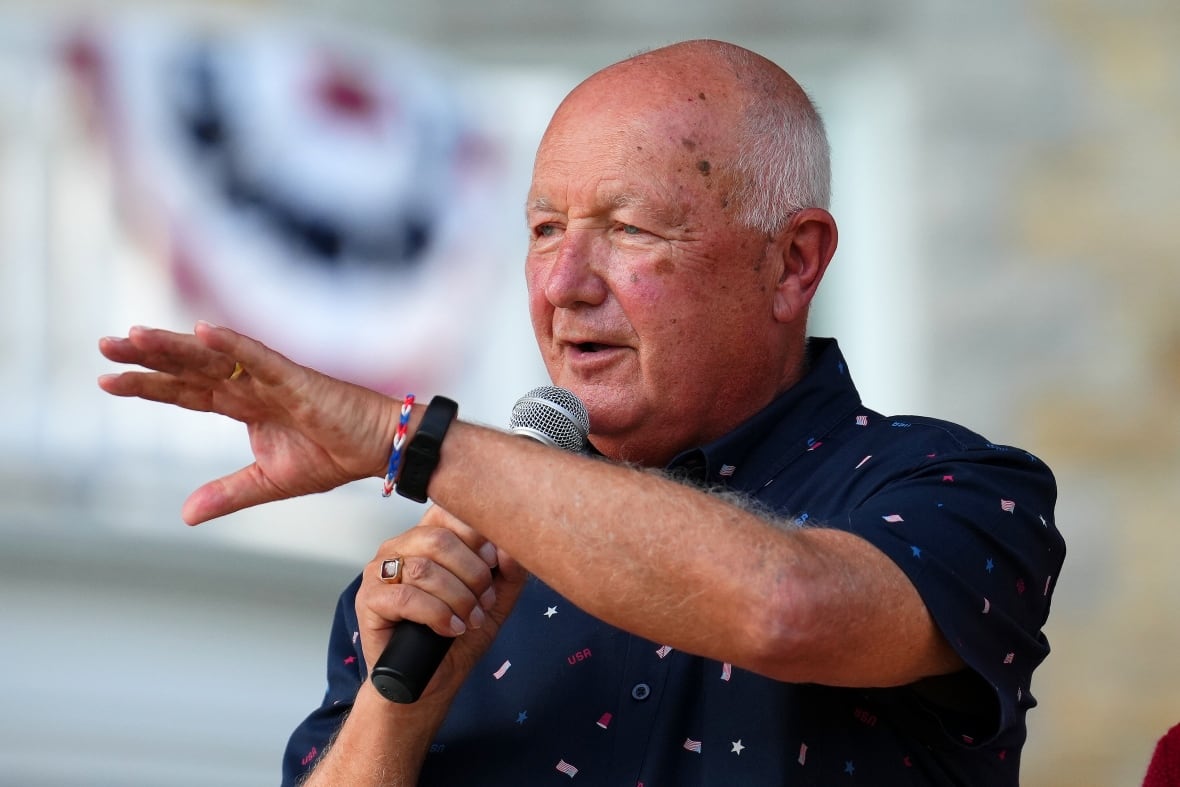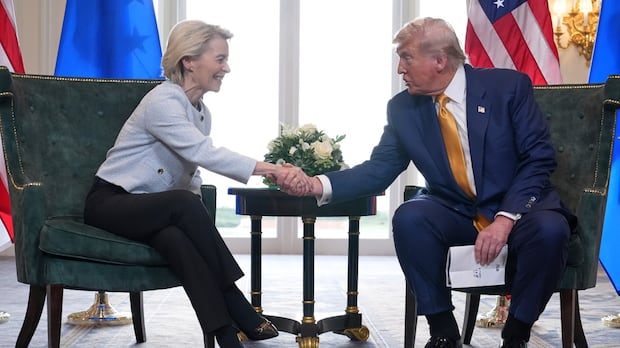Stephen Harper says he advised Mark Carney's government to move away from the U.S.
Former prime minister calls trade war a 'wake-up call,' adding Canada needs to diversify trade
Speaking before a room full of policymakers from midwestern Canada and the United States, former prime minister Stephen Harper said the ongoing trade war with the U.S. is a "wake-up call" for Canada to diversify its trade and export markets.
"I was — I think it's fair to say — probably the most pro-American prime minister in Canadian history," Harper said of his tenure from 2006 to 2015.
If the current government asked him a year ago for advice on U.S. President Donald Trump being re-elected and wanting to renegotiate trade, he says he would have thought it was a real opportunity for Canada to deepen its economic and security partnership with the United States.
"However, when this government did actually ask me a few weeks ago ... my advice was the opposite," he told the Midwestern Legislative Conference, an annual non-partisan event being held in Saskatoon this year under the shadow of the ongoing U.S.-Canada trade war.
Harper called the trade war unfortunate, but said Canada has become "grossly" overly reliant on the U.S. — "independent of the current disputes" — and there is no reason for that.
"Just because we have that geographical proximity does not justify the degree of dependence that we have on a single market," he said.
Tariff barriers a 'failed economic policy,' says Harper
The idea of tariff barriers to raise revenue and relocate industries is "a failed economic policy where it has been tried," Harper said, adding U.S. lawmakers should "bring the facts to bear on Washington."
"Understand that Canada is your largest, most balanced and most lucrative trade arrangement in the entire world, by a lot."
U.S. Ambassador to Canada Pete Hoekstra spoke after Harper and said the U.S. believes it needs a strong manufacturing sector and Trump's agenda supports growing the U.S. economy.
"We cannot sustain, as the leader of the free world, $37 trillion in debt and $2 trillion of annual deficits each year," said Hoekstra.
He says that's why the president embarked on the issue of trade, bringing in tariffs.

On the current trade negotiations, for which Trump originally gave Canada an Aug. 1 deadline, Hoekstra said he believes once the U.S. and Canada have finished, "the framework will change, but the fundamental fabric that holds our countries together will continue to be there."
Premier Scott Moe said Canada needs to be "far below" the 15 per cent tariffs that the EU agreed to over the weekend, and says he's waiting until after Aug. 1 to consider using goods from Saskatchewan, such as potash and uranium, as leverage during trade negotiations.
The province of Saskatchewan has many cards to play, said Moe, but "Canada and the U.S. are actually on the same card-playing team."
The conference began on Sunday and runs to Wednesday. It brings together provincial and state legislators from Canada and the American Midwest. Saskatchewan, Alberta, Manitoba and Ontario are the Canadian provinces in attendance, and Illinois, Indiana, Iowa, Kansas, Michigan, Minnesota, Nebraska, North Dakota, Ohio, South Dakota and Wisconsin are the U.S. states.
Conference chair and Saskatchewan MLA Lori Carr said the goal is to find common ground on the regional level and learn from each other, adding that if policymakers cook up a possible trade resolution, they'll take it to their respective federal governments.
"We really are talking more local here," Carr said.
She described it as an opportunity to share regional success stories, citing carbon capture in Estevan, Sask., about 205 kilometres southeast of Regina, as an example.
"If they still have coal plants that are burning, then they might be able to take up this technology," Carr said.
"We have a lot of trade that goes back and forth across the United States border from Saskatchewan and the majority of our trade goes to these 11 U.S. states," Carr said. "So they're our customers, in essence."
Understanding needed, says MLA
Manitoba MP Terry Duguid said it's a special time in Canada-U.S. history. He said the conference will help emphasize what Canada and the U.S. have in common "rather than our differences."
"It's important to understand one another and the ties that unite us in trade and defence," Duguid said. "Our relationship — despite headlines — is strong, is very connected and integrated."
Topics that might come up this week include the importance of the agriculture economy, energy, border security and water management, Duguid said, calling water especially important given the drought hitting much of the west.
Illinois state Sen. Elgie Sims said the mood among delegates has been positive so far, despite the trade war looming over the conference.
"I think we all understand we're, at our core, we're friends, we're partners, we're allies," said Sims.
Both Trump and Carney have signalled there might not be a new trade agreement by Friday.


